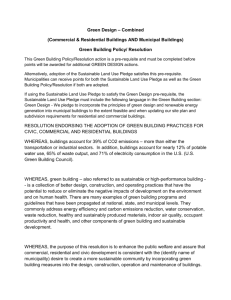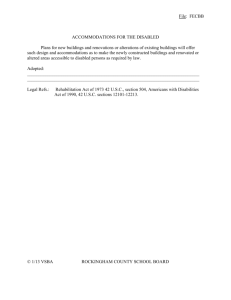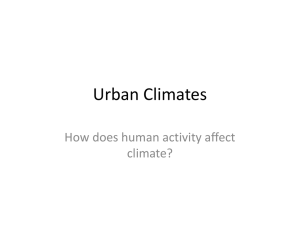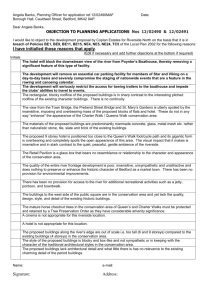BCAP Model Legislation - The Building Codes Assistance Project
advertisement
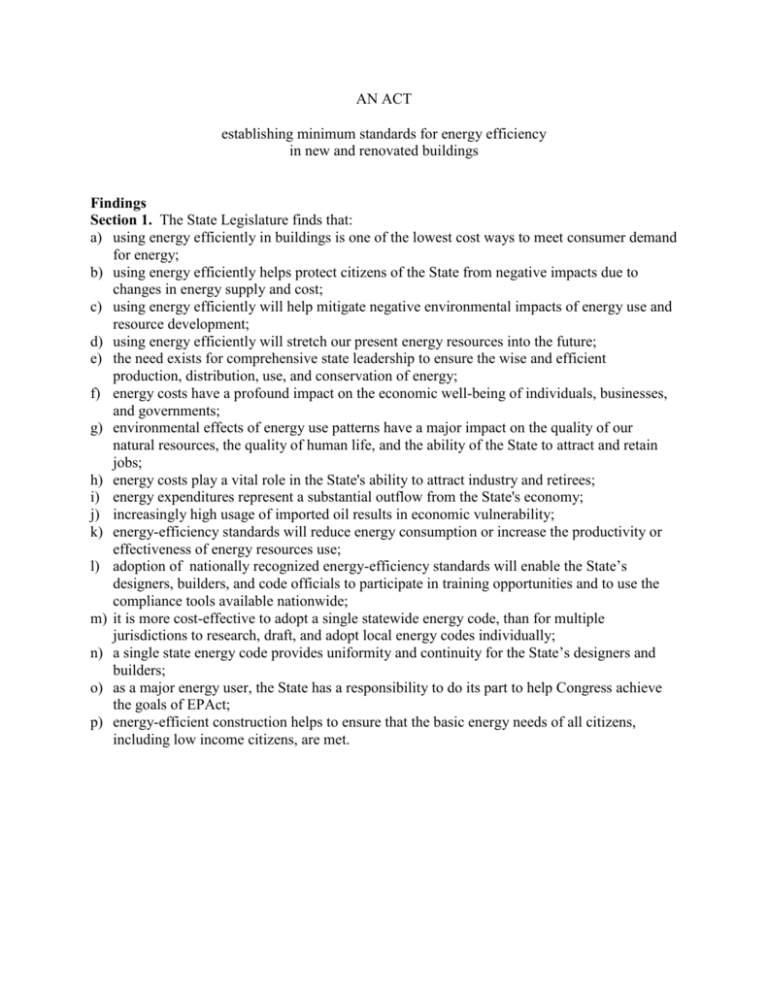
AN ACT establishing minimum standards for energy efficiency in new and renovated buildings Findings Section 1. The State Legislature finds that: a) using energy efficiently in buildings is one of the lowest cost ways to meet consumer demand for energy; b) using energy efficiently helps protect citizens of the State from negative impacts due to changes in energy supply and cost; c) using energy efficiently will help mitigate negative environmental impacts of energy use and resource development; d) using energy efficiently will stretch our present energy resources into the future; e) the need exists for comprehensive state leadership to ensure the wise and efficient production, distribution, use, and conservation of energy; f) energy costs have a profound impact on the economic well-being of individuals, businesses, and governments; g) environmental effects of energy use patterns have a major impact on the quality of our natural resources, the quality of human life, and the ability of the State to attract and retain jobs; h) energy costs play a vital role in the State's ability to attract industry and retirees; i) energy expenditures represent a substantial outflow from the State's economy; j) increasingly high usage of imported oil results in economic vulnerability; k) energy-efficiency standards will reduce energy consumption or increase the productivity or effectiveness of energy resources use; l) adoption of nationally recognized energy-efficiency standards will enable the State’s designers, builders, and code officials to participate in training opportunities and to use the compliance tools available nationwide; m) it is more cost-effective to adopt a single statewide energy code, than for multiple jurisdictions to research, draft, and adopt local energy codes individually; n) a single state energy code provides uniformity and continuity for the State’s designers and builders; o) as a major energy user, the State has a responsibility to do its part to help Congress achieve the goals of EPAct; p) energy-efficient construction helps to ensure that the basic energy needs of all citizens, including low income citizens, are met. Definitions Section 2. In this Act: a) "ASHRAE/IESNA 90.1" means the most recent published document developed by the American Society of Heating, Refrigerating and Air Conditioning Engineers and the Illuminating Engineers Society of North America entitled "Energy Efficient Design of New Buildings Except Low-Rise Residential Buildings;" b) "Builder" means the prime contractor that hires and coordinated building subcontractors or if there is no prime contractor, the contractor that completes more than fifty percent of the total construction work performed on the building; c) "Designer" means the architect, engineer, landscape architect, interior designer, or other person who performs the actual design work or is under the direct supervision and responsibility of the person who performs the actual design work; d) "Energy conservation" means the reduction of energy consumption; e) "Energy efficiency" means the productivity or effectiveness of energy resources use; f) "International Energy Conservation Code" or the most recent published edition developed by the International Code Council, Inc., entitled "International Energy Conservation Code", also referred to as "IECC"; g) "Renovations" means any new construction or addition to an existing building. Technical Building Codes and Standards Board Section 3. The Technical Building Codes and Standards Board, established in (Enter: Said State Department where Board will be located), is established to adopt, amend and maintain the (Enter: Said State) Uniform Building Energy Code, to resolve conflicts between the (Enter: Said State) Uniform Building Energy Code and other building-related codes and to provide for training for municipal building inspectors. 3.1. The board consists of (Enter: Number) voting members, appointed by the Governor: A. The State Fire Marshal or a designee; B. A fire chief, recommended by the (Enter: Said State) Fire Chiefs' Association or its successor organization; C. A municipal code enforcement officer employed by a municipality, recommended by the (Enter: Said State) Municipal Association or its successor organization; D. A residential builder recommended by a statewide regional association of home builders and remodelers; E. A commercial builder recommended by a statewide association of general contractors; F. An architect licensed in the State who is accredited by a nationally recognized organization that administers credentialing programs related to environmentally sound building practices and standards, recommended by a statewide chapter of a national institute of architects; G. A structural engineer licensed in the State, recommended by a statewide association of structural engineers; H. A historic preservation representative, recommended by the (Enter: Said State) Historic Preservation Commission, with experience implementing the standards for the treatment of historic properties set, who is: (1) An architect licensed in the State; (2) A structural engineer licensed in the State; or 3 (3) A builder; I. An energy efficiency representative, recommended by the director of the Governor's Office of Energy, who is: (1) An architect licensed in the State; (2) A structural engineer licensed in the State; or (3) A builder; and J. A professional building access specialist experienced with state and federal accessibility regulations, recommended by the (Enter: Said State) Human Rights Commission. A member appointed under this subsection must have at least 5 years' experience in the field that member is nominated to represent and must be employed in that field. 3.2. The Commissioner of (Enter: Said Department where board will be located), or the commissioner's designee, serves as a nonvoting ex officio member and as the chair of the board. The chair is responsible for ensuring that the board maintains the purpose of its charge when executing its assigned duties, that any adoption and amendment requirements for the (Enter: Said State) Uniform Building Energy Code are met and that training and technical assistance is provided to municipal building inspectors. 3.3. Appointments to the board are made for a 4-year term, and members are eligible for reappointment. If there is a vacancy for any cause, the Governor shall make an appointment immediately effective for the unexpired term. A member of the board may be removed from the board for cause by the Governor. 3.4. The board shall meet quarterly and at such other times as the board determines necessary. Five voting members of the board constitute a quorum for the transaction of business under this chapter. 3.5. In addition to other duties set forth in this chapter, the board shall: A. Adopt rules necessary to carry out its duties. Rules adopted pursuant to this chapter are routine technical rules as defined in (Enter: Said location of code in State Code ex. Title 2, chapter 100, subchapter 1-E); B. Adopt, amend and maintain the (Enter: Said State) Uniform Building Energy Code; C. Adopt rules for the review and adoption of amendments to the (Enter: Said State) Uniform Building Energy Code, including: (1) A process for consideration of amendment proposals submitted by municipalities, county, regional or state governmental units, professional trade organizations and the public; 3.6. The board shall appoint a 5-member training and certification committee, referred to in this section as "the committee," to establish the training and certification requirements for municipal building inspectors. 3.7. The committee shall direct the training coordinator of the (Enter: Said Name of the State department that will manage building codes ex. Division of Building Codes and Standards), to develop a training program for municipal building inspectors. 3.8. The committee shall annually review the training program developed pursuant to subsection 2 to confirm that training courses are regularly offered in geographically diverse locations and that training for municipal building inspectors is fully funded by the State. 4 Building Energy Standards Section 4. Any building designed, constructed, or renovated within the State shall conform to standards that meet or exceed those established by the most recent published edition of the International Energy Conservation Code for detached 1- and 2-family dwellings and other residential structures three stories or less in height, or those established by the most recent published edition of ASHRAE/IESNA Standard 90.1 for all other structures. 4.1. These building energy standards shall not require adoption by county or municipal governments before they shall be effective in individual counties and municipalities. 4.2. Nothing in this Act shall preclude local government from enacting more stringent requirements for energy efficient construction than those specified in Section 3.1. Administration Section 5. Until such time as there is established a State Building Code Office, the implementation and revision of the Building Energy Standards shall be the responsibility of the State Energy Office. 5.1. Any municipality where a building permit is required for new construction or for renovations of existing structures shall be responsible for ensuring enforcement and compliance with said Building Energy Standards. 5.2. A municipality that is required to have an inspector of buildings shall enforce the code. Enforcement may be provided through interlocal agreements with other municipalities or by contractual agreements between municipal, county or regional authorities. Contracts with 3rdparty-certified inspectors may be used in place of local code enforcement officers to enforce this chapter. A. An inspector of buildings shall review applications, review construction documents and issue permits for the erection, alteration, demolition and moving of buildings and structures, inspect the premises for which such permits have been issued, enforce compliance with the code and issue certificates of occupancy. B. An inspector of buildings may accept reports of inspection by agencies or individuals approved by the board. Reports of such inspections must be in writing and be certified by a responsible officer of an approved agency or by the responsible individual. The inspector of buildings is authorized to engage such expert opinion as necessary to report upon unusual technical issues that arise. 5.3. In municipalities where a building permit is not required for new construction or renovations of existing structures, the designer and builder are each responsible for filing a certification with the State Energy Office that the building is designed and constructed in accordance with said Building Energy Standards. Penalty for violation is revocation of occupancy permits or stoppage of construction until the violation is corrected. 5.4. The State Energy Office has the authority to perform random inspections and to issue violations on buildings constructed in areas where no building permit is required. The State 5 Energy Office has the authority to collect building energy standards compliance information and data from local governments that require building permits. 5.5. The State Energy Office has the authority to levy fees for certification of building energy standards compliance sufficient to cover the cost of random inspections and certification recordkeeping. Standards Revision Section 6. Until such time there is an established Technical Building Codes and Standards Board, the State Energy Office shall have the responsibility to amend or revise the Building Energy Standards based on the best available technology that is life-cycle cost effective and at least every three years and within one month from publication of the latest edition of the model energy conservation code, the International Energy Conservation Code (IECC), published by the International Code Council or ASHRAE/IESNA Standard 90.1, published by the American Society of Heating, Refrigerating and Air Conditioning Engineers and the Illuminating Engineers Society of North America. Prior to adoption of any proposed amendment, modification, or new provision and until such time there is an established Technical Building Codes and Standards Board the State Energy Office shall conduct public hearings as required for the adoption of rules. Exemptions Section 7. The following structures are exempt from this Act: a) Buildings or portions thereof whose peak design rate of energy usage is less than 3.4 Btu/h per square foot or 1.0 watt per square foot of floor area for all purposes; b) Buildings or portions thereof which are neither heated nor cooled; c) Mobile homes; and d) Temporary use structures such as hunting and fishing camps, boat houses, remote cabins, etc. which are not considered dwelling units. Effective Date Section 8. This Act shall take effect one month from publication of the adopted model energy code. 8.1. A municipality that has more than (Enter: Decided Amount of Residents ex. 2,000) residents that has adopted any building code by (Enter: Said Date) shall begin enforcement of the (Enter: Said State) Uniform Building Energy Code adopted pursuant to the (Enter: Said State) Revised Statutes (Enter: Location of Codes) by (Enter: Said Date). Any municipality with more than 2,000 residents that has not adopted any building code by (Enter: Said Date) shall begin enforcement of the (Enter: Said State) Uniform Building Energy Code by (Enter: Said Date). 6



